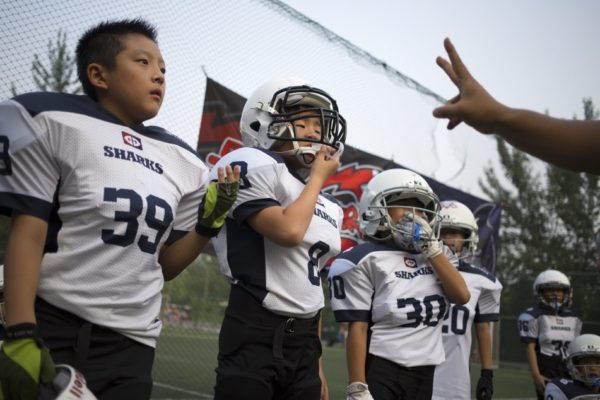Football is Taking Hold in China

Image photo courtesy the American Football Union // Photo Credit
Character. Self-reliance. Responsibility.
These are universal traits that parents want their children to learn.
In China, an increasing number of young athletes are turning to a relatively new sport – for them at least – that communicates the inherent values that culture so dearly respects.
Siyu Chen, a former football player, coach and official who is studying for his Ph.D. in sports education at Beijing Union University is mre than enthusiastic about the game and its growth in China:
“Football teaches leadership, teamwork. Football teaches you that when you get hit, you get back up and compete. In China, that is an important lesson to learn.”
Chen works with Ken Li at AFU Limited, which brings football to eight Chinese universities through the American Football Union. Both men took part in a shadowing program alongside game officials at the 2015 IFAF World Championship.
Li fell in love with the sport 30 years ago when he lived in San Francisco during the height of the 49ers teams led by Joe Montana and Jerry Rice.
He’s led groups of Chinese students into Sweden for exhibition matches and has a similar event in Mexico this year.
Li said football’s popularity in China goes beyond the physical nature of it. Its combination of physical and mental aspects likens it to what martial arts pupils spend their whole lives mastering.
“American football is strategic, more so than any other sport we have here in China,” Li said. “And along with team success, there is personal development that can be gained in every practice, every game. And, most importantly, it’s fun.”
Football also is gaining a foothold on the youth level in China. The Great Stone Gridiron was founded three years ago by businessman Jin Xin and two partners. He played football while attending high school in Georgia and saw a future for the sport in his home country.
The league includes players ages 6 to 10 and has increased from three teams in 2012 to 36 last year.
“It’s very important to cultivate that zeal at an early age,” Xin told the South China Morning Post. “Most of these children enjoy playing out of true interest, and the sport helps them grow up to be outgoing yet disciplined young men.”
The biggest challenges facing Chinese football right now is government support, equipment coaches and game officials, Li said. His presence in Canton, Ohio, as part of the IFAF World Championship in part was to bring coaching and officiating knowledge back to China.
But because football is not an Olympic sport, it has no Chinese ministry, and it is up to private individuals to support it. And even though many helmets and shoulder pads are made in or nearby China, import-export laws require the gear to be shipped over to U.S. companies before being shipped back to those who need it.
Still, Li sees football with a strong future in this country of 1.3 billion people. Since 2010, the number of Chinese residents who identify themselves as NFL fans has grown from 1.6 million to 17.7 million
“The Olympics would help, but we are not relying on that,” Li said. “We have seen passion for the game, and it will grow in China. The only question is how quickly.”
The sport is still a culture shock to many in China, Chen said, and he expects football will go through the same growing pains as rugby, which is now wildly popular.
“Right now, so many Chinese people see the hitting and think it’s rude,” Chen said. “But they need to go to the field and play it or watch it in person. They will like it.”
Link to original article from USA Football.

